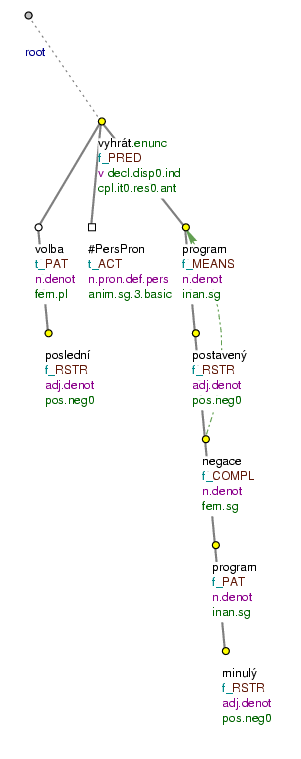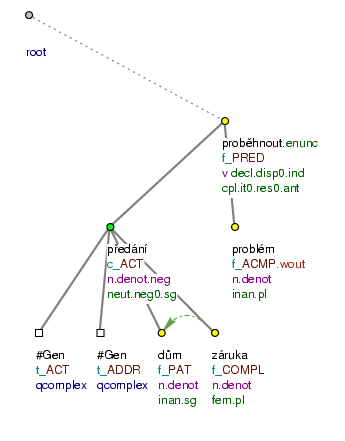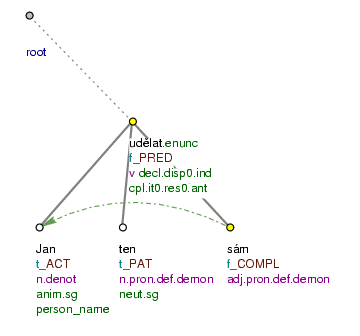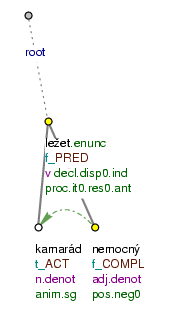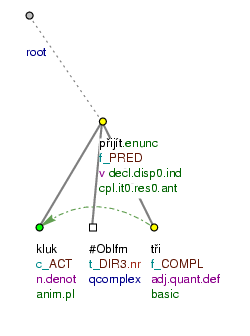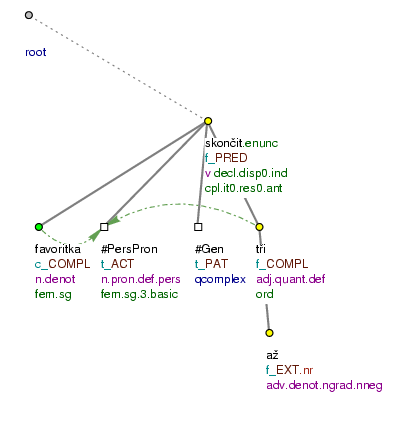Predicative complements expressed by a noun can be:
-
simple (i.e. not introduced by a preposition or conjunction),
-
introduced by the conjunctions "jako", "jakožto", "coby".
Predicative complements are classified here according to which traditional part of speech they are expressed by, i.e.:
-
predicative complement expressed by a noun (see Section 10.1.1, "Predicative complement expressed by a noun"),
-
predicative complement expressed by an adjective (see Section 10.1.2, "Predicative complement expressed by an adjective"),
-
predicative complement expressed by a numeral (see Section 10.1.3, "Predicative complement expressed by a numeral").
A noun in the position of a predicative complement and its governing noun in principal agree in gender and number, but not necessarily. The case of the noun is determined by the valency of the verb with simple predicative complements and in cases of predicative complements introduced by a conjunction, the predicative complement has the same case as its governing noun.
A simple nominal predicative complement represents the least frequent type of predicative complement. Its form is fixed, lexicalized, e.g.:
Seděla mu modelem.COMPL (=lit. (She) was_sitting (for) him (as) (a) model.) Fig. 6.167
Examples of nominal predicative complements with the conjunction jako, jakožto, coby (=as):
Pozvali toho chlapce jako představitele.COMPL hnutí (=lit. (They) invited the boy as (a) representative (of) (the) movement.). Fig. 6.168
Dal domy coby záruku.COMPL (=lit. (He) gave (the) houses as (a) guarantee.) Fig. 6.169
S Čechy jako s národem.COMPL počítáme (=lit. With (the) Czech as - (a) nation (we) count (on).)
Nominalization of the verb on which the predicative complement depends. Constructions with a nominalization of a verb are represented in a way similar to the constructions in which the predicative complement depends on a finite verb form. They only differ in the structure: while the node representing the second governing element (i.e. the node representing a noun) of a predicative complement depends on the verb too, this does not have to be the case with predicative complements modifyng deverbal adjectives.
Compare:
-
Poslední volby vyhrál s programem postaveným jako negace.
COMPLprogramu minulého (=lit. (The) last election (he) won with (a) program constituted as (a) negation (of) (the) program last.)The predicative complement jako negace (=lit. as (a) negation) depends on the deverbal adjective postaveným (=constituted) and on the prepositional phrase s programem (=lit. with (a) program). The dependency on the deverbal adjective is represented by an edge. The dependency on the prepositional phrase is represented by the attribute
compl.rf(srov. Fig. 6.170).
Examples of predicative complements dependent on a nominalized verb:
Předání domu coby záruky.COMPL proběhlo bez problémů (=lit. (The) hand _over (of) (the) house as (a) guarantee passed_off - -.) Fig. 6.171
Postavení programu jako negace.COMPL se jim vyplatilo (=lit. (The) constitution (of) (the) program as (a) negation - (for) them paid_off.).
Za sezení modelem.COMPL jí platil (=lit. For sitting (as) (a) model (he) her paid.).
Figure 6.167. Predicative complement expressed by a noun
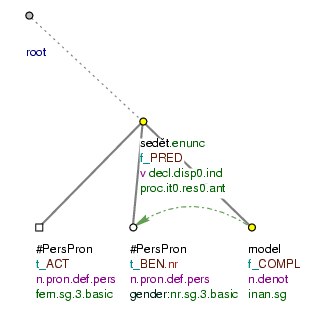
Seděla mu modelem. (=lit. (She) was_sitting (for) him (as) (a) model.)
Figure 6.168. Predicative complement expressed by a noun
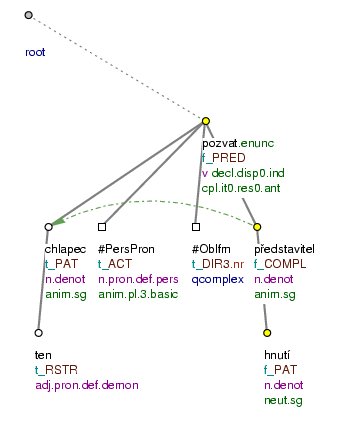
Pozvali toho chlapce jako představitele hnutí. (=lit. (They) invited the boy as (a) representative (of the) movement.)
Figure 6.169. Predicative complement expressed by a noun
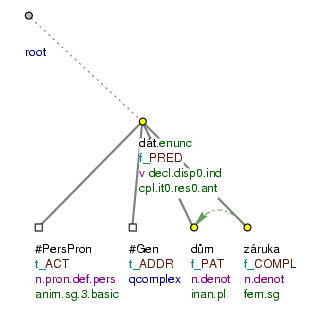
Dal domy coby záruku. (=lit. (He) gave (the) houses as (a) guarantee.)
Adjectival predicative complements (simple or introduced by a conjunction) formally express the dependency on the governing noun: by agreement in gender, number and case.
The term simple adjectival predicative complement is used for cases in which an adjectival attribute does not occupy its unmarked pre-nominal position but when it occurs in the post-nominal position or another position within a sentence; cf.:
-
Mám rád studené.
RSTRpivo (=lit. (I) - like cold beer.) -
Mám rád pivo studené.
COMPL(=lit. (I) - like beer cold.) -
Pivo mám nejradši studené.
COMPL(=lit. Beer (I) - like the_best cold.)
This rule does not apply to set expressions with a postponed attribute such as kočka domácí (=lit. cat domestic), kyselina sírová (=lit. acid sulphuric).
No node representing the governing noun of the adjective is added with predicative complements (see also Section 12.1.2, "Ellipsis of the governing noun").
Examples of simple adjectival predicative complements:
Našli kamaráda nemocného.COMPL (=lit. (They) found (a) friend ill.) Fig. 6.172
Jan to udělal sám.COMPL (=lit. Jan it did by_himself.) Fig. 6.173
Jan seděl na návštěvě spokojený/spokojen.COMPL (=lit. Jan was_sitting on (a) visit content.)
Jan potkal kamaráda převlečeného.COMPL za Fausta (=lit. Jan met (a) friend dressed_up like Faust.)
Propiskou píšu jen modrou.COMPL (=lit. With (a) stylo (I) write only blue.)
Jana to udělala ráda.COMPL (=lit. Jana it did with_pleasure.)
Zvířata jsou po pokusu všechna.COMPL utracena (=lit. (The) animals are after (the) experiment all put_down.)
Rád.COMPL bych zdůraznil, že to není náš problém, ale váš (=lit. (I) like would to_emhasize that it is_not our problem but yours.)
Sami.COMPL zakládají družstva nová.COMPL (=lit. Themselves (they) establish associations new.)
Examples of adjectival predicative complements with the conjunction jako, jakožto, coby (=as/like):
Kamarád ležel jako nemocný.COMPL (=lit. (The) friend was_lying as_if ill.) Fig. 6.174
Mzdová regulace se bagatelizuje jako bezvýznamná.COMPL (=lit. Wage regulation is_disparaged as meaningless.)
Constructions with a simple adjectival predicative complement and those with a conjunction have been represented in the same way so far although they differ both formally and semantically. cf.:
-
Našel kamaráda nemocného (=lit. (He) found (a) friend ill.).
The simple adjectival predicative complement expresses a permanent quality.
-
Našel kamaráda jako nemocného (=lit. (He) found (a) friend as_if ill.)
The adjectival predicative complement with a conjunction expresses a temporary quality.
!!! The two constructions will be distinguished by subfunctors of the functor COMPL in the future.
Nominalization of the verb on which the predicative complement depends. Constructions in which the verb is nominalized are represented in a way similar to the constructions in which the predicative complement modifies a finite verb form. They only differ in the structure: while the node representing the second governing element (i.e. the node representing a noun) of the predicative complement depends on the verb too, this does not have to be the case with predicative complements modifying deverbal adjectives.
Figure 6.172. Predicative complement expressed by an adjective
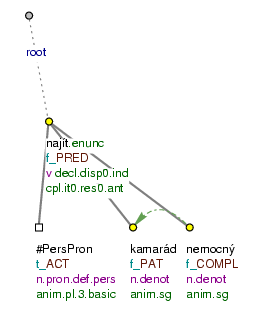
Našli kamaráda nemocného. (=lit. (They) found (a) friend ill.)
If a numeral in a sentence with a full verb is detached from its counted object, it is represented as a predicative complement. No node for a governing noun is added to the structure.
Examples of predicative complements expressed by a numeral:
Kluci přišli tři.COMPL (=lit. (The) boys came three.) Fig. 6.175
Jako favoritka.COMPL skončila až třetí.COMPL (=lit. As (a) favourite (she) was only the_third.) Fig. 6.176
Dívky přišly jen dvě.COMPL (=lit. (The) girls came only two.)
Stromů porazili skoro tisíc.COMPL (=lit. Trees (they) cut down almost (a) thousand.)
Petr doběhl jako druhý.COMPL (=lit. Petr came as second.)
